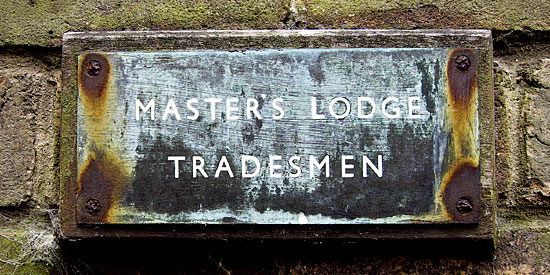
Nice image. Photographed by my son Brian in the spirit of Edward Hopper’s Nighthawks, one of my favourite pictures.


Nice image. Photographed by my son Brian in the spirit of Edward Hopper’s Nighthawks, one of my favourite pictures.

… is alive and well in Cambridge — c.f. this notice outside the Master’s Lodge at Churchill College, supposedly one of the university’s more modern colleges! Interesting that the architects didn’t think tradesmen were worth even a brass plate.

One of a series of images I’ve been using to test the Beta of Adobe LightRoom.
If there is an emerging consensus among much of the Democratic Party establishment, it is that blogs are an important, potentially crucial emerging power in American politics, as reflected by the turnout of Democratic leaders here this weekend. What is less clear is how mainstream politicians like Mr. Warner — or the Senate minority leader, Harry Reid of Nevada, who was scheduled to address them Saturday night — will grapple with an audience that has defined itself in part by its dissatisfaction with mainstream politicians.
Indeed, there was evidence of a gulf in the way the two sides view their relationship. For the 1,000 or so bloggers at the YearlyKos Convention here, the mission is nothing short of trying to transform the way politics are done. For some of the political leaders who stopped off for a quick panel or reception, the visits seemed more along the lines of another constituent box to be checked on the campaign circuit, whose value does not extend beyond its checkbook or voter turnout operations.
Steve Soto, who writes The Left Coaster blog, said that the Democratic leaders running the campaigns to win the House and Senate “are still treating the blogs and some of the advice from them about message and focus as unwanted solicitations from crazy relatives.”
From the NYT report of the convention.
The Observer also has a report by Paul Harris on the convention.
This morning’s Observer column…
When many of the current crop of senior telecoms executives pass away, the word ‘Skype’ will be found engraved on their hearts. Skype, as every teenager knows, is a system for making free telephone calls over the internet.
All you need is a computer and a broadband connection at either end. If you want to make calls from your computer to an ‘ordinary’ telephone, you can pay Skype a small ‘Skype-out’ fee. Now you can also sign up for a ‘Skype-in’ service, which allows folks with ordinary phones to call you on your PC.
Since its inception in 2003, Skype’s subscriber numbers have followed the time-honoured exponential curve. The company now claims to be adding 150,000 registered new users a day. And yes, you read that correctly: 150,000 a day. For telecoms, these numbers are bad enough. But what’s worse is that Skype is adding all those new subscribers without investing a cent in plant and equipment….
From this morning’s New York Times…
WASHINGTON, June 9 (Bloomberg News) — Comcast, Vonage and other companies that provide telecommunications services over the Internet must allow wiretapping of phone calls by law enforcement officials, a federal appeals court ruled Friday.
In a 2-to-1 decision, the Court of Appeals for the District of Columbia Circuit upheld a Federal Communications Commission directive treating such companies the same as conventional phone companies for law enforcement purposes. Comcast and other cable companies offer Internet service over their networks, and Vonage is the biggest provider of Web-based phone service…
Yes, but what will they do about Skype, which is a P2P system?
See this exquisite piece of design.
Thanks to Brian for spotting it.
Hmmm… From Good Morning Silicon Valley…
Has Google begun recalibrating its Evil Scale? If it hasn’t yet, it certainly seems to be considering it. Addressing reporters in Washington yesterday, Google co-founder Sergey Brin admitted that the company has compromised its principles by acceding to Chinese censorship demands and hinted that Google could adjust its stance in the country in the future. “We felt that perhaps we could compromise our principles but provide ultimately more information for the Chinese and be a more effective service and perhaps make more of a difference,” Brin said. “Perhaps now the principled approach makes more sense. It’s perfectly reasonable to do something different, to say, ‘Look, we’re going to stand by the principle against censorship and we won’t actually operate there.’ That’s an alternate path. It’s not where we chose to go right now, but I can sort of see how people came to different conclusions about doing the right thing.”
Quite a change, as GMSV observes, from CEO Schmidt’s confident tone when the original capitulation was announced. “We believe that the decision that we made to follow the law in China was absolutely the right one,” he said at the time. “From our perspective, we must comply with the local law, and indeed, we have all made commitments to the government that we will absolutely follow Chinese law.”
From today’s New York Times…
a nice illustration of a brainteaser I have been giving my friends since I visited Netflix in Silicon Valley last month. Out of the 60,000 titles in Netflix’s inventory, I ask, how many do you think are rented at least once on a typical day? The most common answers have been around 1,000, which sounds reasonable enough. Americans tend to flock to the same small group of movies, just as they flock to the same candy bars and cars, right?
Well, the actual answer is 35,000 to 40,000. That’s right: every day, almost two of every three movies ever put onto DVD are rented by a Netflix customer. “Americans’ tastes are really broad,” says Reed Hastings, Netflix’s chief executive. So, while the studios spend their energy promoting bland blockbusters aimed at everyone, Netflix has been catering to what people really want — and helping to keep Hollywood profitable in the process…
From David Pogue’s Blog…
Today, a cheery/hilarious/frightening story from reader Jeanine Weekes Schroer that really rings the bell on the Ridiculous meter:
“I just had an extremely frustrating experience with the Yahoo/Target photo service, where you upload pictures on Yahoo to pick up prints at Target (in an hour, if you’d like).
“I had uploaded ten pictures (random stuff); I asked for a mix of 8 by 10s, 5 by 7s, and 4 by 6s. One was of my husband’s boat, because he loves it, and another was of my husband fishing near our home, because I love him.
“I showed up at Target’s Photo Center in my small town. The very sweet young girl found my envelope, but it had a note attached to it. The note said, ‘Ask for Copyright release for the 2 pictures lying on the dryer rack.’
“She called for assistance, because she was unsure what to do. The person who answered her call ALSO called for assistance, because she also did not know what to do. A third woman arrived.
“She told me that because of copyright concerns, Target reserves the right not to sell any picture that appears to be professional. She said, ‘Anyone can just download any picture they want, and we’d be liable. I’m sorry, we will not sell you the prints.’
“I proceeded to explain to her, as I had to the sweet teenager and the assistant, that one is a picture of my husband, and the other has ME IN IT with a camera! Surely that doesn’t appear to be professional staging. The manager reiterated, ‘I’m sorry.’
“I asked her if there was any paperwork I could fill out, swearing authorship of the pictures. She reiterated, ‘I’m sorry.’ Then she wandered off.
“They made lame intimations that they could do it if I had the original prints or film (but it was a digital camera, so no such monster), or if I could bring digital media with the pictures on it. I explained that the pictures were both more than a year old and no longer maintained on any memory card.
“It seems to me that they have not worked out a system for best serving the consumer, protecting copyright interests, and fending off lawsuits. I was furious and vowed in a letter never to use their photo system again–and never to go to Target again…